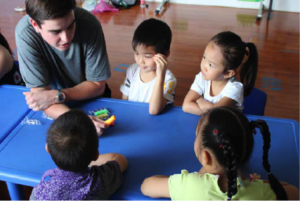By Alan Baubonis
A significant component of the vision for the San-berg International Leadership Program is to connect Servite students with business leaders around the globe. During their time in Beijing, SILP students had the opportunity to meet with Joseph Chen, a pioneer of China’s internet industry and founder of Renren, China’s leading social networking platform. Often referred to as “China’s Facebook,” Chen is of-ten considered “China’s Zuckerberg.” Spending time with Chen was an unparalleled opportunity for the SILP participants and was a highlight of the inaugural seminar.
Sitting at the head of a board room table at Renren’s corporate headquarters in Beijing, Mr. Chen had just taken the eleven Servite students through a brief his-tory of his influential company. Renren was initially founded as a campus networking tool for college stu-dents in China. It later opened to the general public and its user count blossomed for years. Smartphones and mobile innovation proved difficult for Renren. Af-ter ceding Chinese social media dominance to more mobile-savvy platforms, Mr. Chen realized that the brightest prospect for Renren was to turn its efforts to investing in tech start-ups. Renren’s most recent stra-tegic pivot, which began just three years ago, has been lauded as visionary.
The Servite students were impressed by Chen’s em-brace of change. In a follow-up discussion, they admired his tactical agility, “It’s remark-able that he was able to discern what Renren’s challenges were, and recognize what adaptations were needed in order to succeed. Just fighting harder in a losing battle is a lost cause. He had to identify Renren’s strengths and move in a new direction with them, the same way we’ve had to adjust ourselves personally to living in China for the past month.”
The Sanberg International Leadership Program’s first cohort of students particpated in its first month-long immersion seminar in China from June 10-July 10, 2016. The seminar focused on intensive language courses, intercultural communication, and examining leadership in China-US partnerships. Its curriculum brought them through myriad unfamiliar social contexts, including outings with local college students, exchange visits at two high schools, and a tour of a Buddhist temple with its head monk. The meeting with Mr. Chen at Renren was the last of four leadership sessions with notable figures from business and education. It was a sort of capstone for the students’ learning on the seminar, and an inspiring highlight. As rising juniors, these Friars were already beginning to see connections between the skills they were acquiring through the seminar and the ways a CEO applies those same skills to drive his business to success.
The first site for the seminar was Guilin, in muggy southern China. Near-constant rain soaked the students for the entire first week. The rain was a nuisance and major discomfort for several days. Students were perturbed by their constantly-soggy footwear and slippery strolls to class. They dearly missed the rejuvenating rays of Southern California sun. Some outdoor activities had to be rescheduled, and it seemed like they would be soaked for the whole seminar. By the end of week one, however, fortunes changed. The precipitation eased and summery sun emerged. By then, the SILP students had already made some adjustments themselves. They had learned to hail cabs and order at restaurants in Chinese. They had learned to navigate Guilin and found indoor diversions like shopping centers and arcades in their free time. They had accepted the rain and found ways to thrive in spite of it.
More impressive yet were the ways SILP students adapted to the challenges of using a new language in a foreign social world. They had been studying Mandarin Chinese for two years at Servite, but they quickly learned that the leap from classroom practice to full immersion is a drastic one. A limited vocabulary suddenly means much more than just a test score or quiz grade; it determines what meal you’ll be served, how much you’ll pay, or whether or not you’ll reach your destination.
Early on, most were reluctant to speak for fear of being misunderstood. After weeks of intensive language classes and constant practice outside of class, apprehension gave way to eagerness. Fear of mistakes transformed into an inclination to engage. Encounters through pick-up soccer games, learning mahjong, haggling prices with shopkeepers, and clarifying laundry service details with hotel staff all gave rise to a new confidence in speaking Chinese.
This confidence rose noticeably over the course of a planned service learning activity: teaching basic English to kindergarten students from a low-income neighborhood. SILP students were excited and charmed upon arrival. The facility was welcoming and the kindergarteners were adorable. SILP students briefly met with the principal and teachers, who offered supplies such as colored clay, blocks, magnet letters, paper and crayons to use in their lessons. Beyond that, the lessons were up to them. How do you teach English to a 4 year-old who only knows “hello”?
At the start many were visibly flustered, either for lack of teaching experience, lack of time spent with young children, or lack of Chinese vocabulary necessary to explain themselves and understand their young pupils. Within a few minutes, the young men from Servite had all grasped a valuable concept: no matter what language you’re using, attention is earned, not granted.
Some students went for the letters or writing, opting to begin with phonics and letter/sound association. Others began drawing or using objects to teach nouns and colors with visuals. Food seemed to work especially well as a teaching topic. Football (which most Chinese people have never even heard of, let alone seen) was more of a flop. Some SILP students kept their lesson working for groups of five or six; others struggled to keep the lesson going with just a pair. A few SILP volunteers even ventured into using games to teach. The children loved scrambling around the circle in “Duck, Duck, Goose!”
The bus ride home from the kindergarten was telling. Conversation centered on which teaching approaches were successful and which had failed. One student remarked, “Well I know I’ll never be a teacher.” Some were so taken by the experience that they couldn’t wait to check out photos from the day and reminisce about their young students.
The seminar progressed just like that. Servite’s delegation was thrust into new, sometimes awkward, and always ex-citing scenarios, and they found their way through. Sometimes stumbling, sometimes shining, and always taking away a hard-earned insight. Day in and day out for a full month, these young men embodied the very idea that Ren-ren CEO Joe Chen would eloquently deliver at the seminar’s pinnacle event. His words resonated with all. “You can stagnate and struggle, or you can adapt and flourish.”
They had already devoted themselves to the latter.
Alan Baubonis studied Anthropology and Chinese at Boston University. Upon graduation, he moved to Qingdao, China, where he lived for two years studying Chinese and practicing and researching martial arts. From 2007 to 2010, he worked in the Council on East Asian Studies at Yale, running China-re-lated event programming and serving as the Graduate Registrar. From 2010-2016, Baubonis served as the Assistant Direc-tor of the Light Fellowship, which provides full funding for Yale students of exceptional promise to study Chinese, Japanese, or Korean at specifically approved sites in China, Taiwan, Japan, and South Korea. Baubonis now works in Yale’s development office.
Joe Sanberg ‘97 was Vice President and Valedictorian at Servite and graduated Magna Cum Laude from Harvard University. Sanberg began his career as an analyst at Blackstone’s Private Equity Group. He joined Tiger Global Management in 2004, becoming a Managing Director during a period of strong performance for the firm; he left in 2009 to pursue his current activities. Today he is a public and private-sector entrepreneur and investor harnessing the power of innovation to improve the quality of life for all. He is Co-Founder and Chair of the Board of Advisors for Aspiration, a founding investor in Blue Apron, serves as Chairman of the Board of the Jefferson Awards Foundation, and sits on the Board of Trustees of the University of California, Riverside, School of Public Policy.














